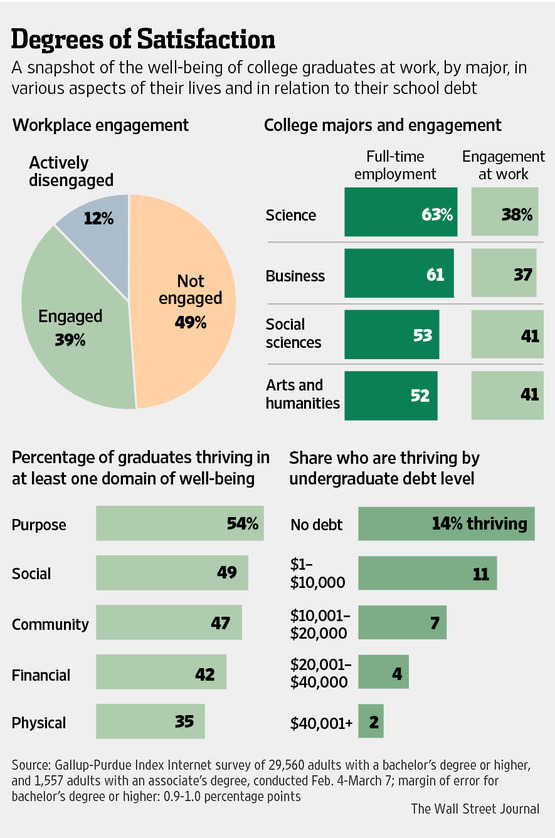Elite colleges don’t buy happiness
We work with many students who think that if they can just get into an elite college, their future prospects and lives will be better.
But according to a new survey, this isn’t necessarily the case. In fact, it’s even possible that attending an elite college could make your life worse–if you take on significant debt to pay for it.
College prestige doesn’t increase happiness or success
A recent Gallup survey of 30,000 college graduates of all ages in all 50 states found that highly selective colleges, such as Ivy League schools, don’t produce better workers or increase a person’s likelihood of being happy in the future.
In fact, it didn’t matter whether a student attended a public or private non-profit college, a highly selective college or a less-selective one.
Where a college placed in the US News & World Report rankings also had no bearing on the student’s future happiness.
Factors like race, ethnicity or by whether the graduate had been the first in his or her family to attend college didn’t make any difference either.
Student loans, college size may impact happiness
A few factors did make a difference, however.
Factors like student debt, college size, and college major all had slight impact on the student’s chances of reporting that they were satisfied and successful.
Some surprising statistics:
- Graduates for-profit colleges were less likely to describe themselves as ‘engaged and thriving’ in their careers.
- Graduates of smaller schools were slightly less likely to be engaged than grads of larger schools (colleges with enrollments of more than 10,000 students).
- Students who graduated in 2010 or later were far less likely to report high levels of well-being compared with older graduates.
- The more money a student owed in loans upon graduation, the less likely he or she was to be happy and thriving.
- Graduates who earned their degree in four years were twice as likely to be engaged in their jobs as people who took longer to graduate.
- Students who majored in the social sciences or humanities were more likely to feel ‘engaged’ at work than those who majored in Science or Business.
Many students still unhappy or struggling
Unfortunately, the number of students who reported feeling engaged at work (meaning that they “enjoyed what they did and are emotionally and intellectually connected to their jobs”) and described themselves as “thriving” in five different aspects of their lives (including financial stability, a strong social network and a sense of purpose) were quite low overall.
Just 39% of college graduates feel engaged at work, and only 11% said they were “thriving.”
Since the numbers were lower for younger students, this may be due to the economic recession and having to ‘work their way up’ in a career in order to find job satisfaction.
Many young graduates are still figuring out what they want to do and may be experiencing the disappointment of ‘real life’ after having a relatively easy, carefree experience in college.
Other students feel stuck in jobs that they dislike because they need to pay back their student loans, which could contribute to feelings of dissatisfaction and unhappiness.
Success depends on the individual student
Confirming what’s been found in earlier studies, there seems to be no link between attending elite colleges and future happiness, higher income and success.
Students who are dead-set on attending an expensive elite college may want to think twice about their reasons for doing so. In fact, taking out student loans to pay for the expensive college might actually be what damages their happiness and financial stability down the line.
It’s easy for parents, too, to get caught up in a name and want to give their child ‘the best’ education possible and increase the student’s future chances of success, when really, college prestige doesn’t make any difference.
In fact, many very successful people, including U.S. Senators and Fortune 500 CEOs, went to lesser-known or low-cost public colleges. And many community college graduates thrive after transferring to a 4-year college.
If you’ve got the drive and intelligence to be successful, you have a chance to be, no matter where you went to college. As Stacy Dale, an economist at Mathematica, a New Jersey research firm, puts it,
Individual traits matter more than where you went. It’s a lot more important what you learn later in life than where you got your undergraduate degree.
No college is worth significant debt
Most of all, this study seems to confirm that you shouldn’t go deep into debt to attend an expensive college.
There are many affordable colleges that provide quality educations and offer significant scholarships, especially for students competitive enough to get into elite schools.
If you need help finding a college you can afford without ‘selling the farm,’ we can help. Give Rick & Andy a call at 1-888-234-3907 or contact us using this form.
choosing a college, college admissions, college value, ivies, return on investment

